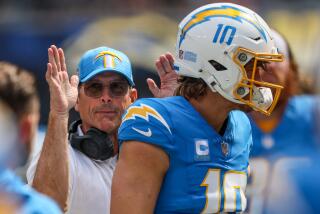They Name Fat Cat No. 30 the Jaguars
- Share via
When I was a kid, I thought the best and surest way to great wealth was to own a railroad or a shipping line or a bank or steel company. Or, failing that, a bag of diamonds. A gold mine.
Hah!
You know the most valuable possession you can have today? An NFL football franchise. It’s your own bag of diamonds, as full of gold as a mine.
First of all, there are only 30 of them in the world. And any time you can own something there are only 29 more of, buy it.
You don’t have to sell the product. You have thousands of newspapers and magazines and three television networks and dozens of cable stations doing it for you. And, in some cases, paying you to let them do it.
You can depreciate the inventory for tax purposes. Your raw material costs you nothing. It is mined (read recruited), refined, polished, publicized and delivered to you with its compliments by the nation’s colleges and universities. Just imagine U.S. Steel getting its iron ore dug out for it, loaded onto ore boats and deposited at Bethlehem free of charge and you get the picture.
And then--how sweet it is!--you get the nation’s cities fighting for you, begging you to open for business at their stands.
Now, it’s customary in our capitalist society for chambers of commerce to sweeten the pot for incoming businesses. In some cases, they build roads or plant trees. But that’s because they know they’ll get it back in taxes and employment revenue.
But they don’t build your factory and set up your machinery for you--and then lease it to you at a dollar a year. They do that all the time in pro football.
It’s hard to understand the reasoning of cities. They thirst to have “big league” status as if, somehow, that certified their existence. Like, it gives you some cachet to be able to say “I’m from Tampa, home of the Buccaneers.”
The city of Jacksonville, Fla., pop. 693,546, is the latest to join the modern billionaires’ club otherwise known as the National Football League. It didn’t come cheap. The creation of the Jacksonville Jaguars may minister to municipal esteem, but they got pledged to this august fraternity by a vote of 26-2 by the brothers only after the brothers were promised $121 million of the taxpayers’ money--to say nothing of other perks like concession and parking revenues.
The team logo, fittingly, is teal, black, gold and silver. Color them expensive.
P.T. Barnum must want to sit right down and have a good cry someplace today.
What impels communities that have far more pressing needs--police, fire protection, hospitals, infrastructure repair--to opt instead for the opportunity to sit in paint and animal hats in the stands and shout “Dee-fense!”is hard to fathom.
Juvenal, back in 100 A.D., said the only two things people required to keep from getting mutinous were bread and circuses. How much has changed in 2,000 years?
When the Rams moved out of Cleveland to Los Angeles in 1946, no brass bands or civic celebrations awaited them. Not only did no one promise them free rent, but the colleges stormily tried to prevent them from playing in the Coliseum at any cost. They came with their hats in their hands, wiped their feet and were greeted with suspicion and hostility. Now, teams come in on their own terms.
The chambers of commerce hail their coming as the making of their communities. Maybe so. But, did Rome need the Christians and the lions?
“This gives the nation a clear sense of how dynamic our city is,” trumpeted Jacksonville’s head drum beater.
But is the economic impact what it is held out to be? Will a midseason game between the new Jacksonville Jaguars and the Cincinnati Bengals attract new visitors to the city or just people who would spend their money in the mall if there were no game to go to? No one ever computed exactly how much a franchise contributed to local economy. If anything.
The new franchise holders have guaranteed visiting teams $1 million a game. They will pony up $140 million and they will get only one-half of the television income the established teams will get.
But, they gotta have it. Jacksonville will be the second-smallest NFL market--only Green Bay is smaller.
But a small market is possible in football, where you have to fill your stadium only eight times a year (as opposed to 81 in baseball or 41 in basketball). And, Jacksonville, now nearly 700,000, had only 204,000 citizens in 1950.
Don’t look now, but I doubt Green Bay has had that increase.
So, they’re all grown up now. They’re on the map. They’re what they hankered to be--a big city.
A horrible ambition. You wonder if they have studied the fate of big cities of late. If they have, and they make the grade, they may wish they’d put the money into something more sensible. Like jails.
More to Read
Sign up for The Wild
We’ll help you find the best places to hike, bike and run, as well as the perfect silent spots for meditation and yoga.
You may occasionally receive promotional content from the Los Angeles Times.






